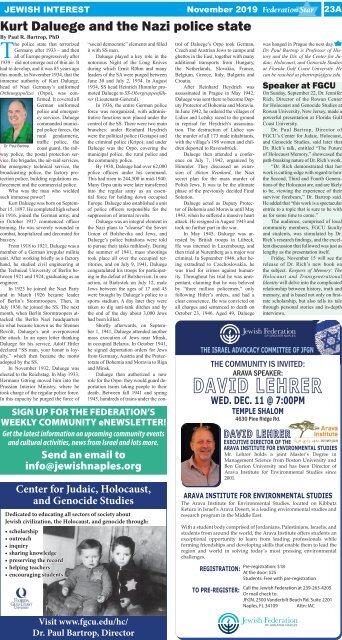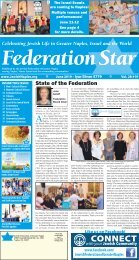Federation Star - November 2019
Monthly newspaper of the Jewish Federation of Greater Naples
Monthly newspaper of the Jewish Federation of Greater Naples
- No tags were found...
You also want an ePaper? Increase the reach of your titles
YUMPU automatically turns print PDFs into web optimized ePapers that Google loves.
JEWISH INTEREST<br />
SIGN UP FOR THE FEDERATION’S<br />
WEEKLY COMMUNITY eNEWSLETTER!<br />
Get the latest information on upcoming community events<br />
and cultural activities, news from Israel and lots more.<br />
Send an email to<br />
info@jewishnaples.org<br />
Center for Judaic, Holocaust,<br />
and Genocide Studies<br />
Dedicated to educating all sectors of society about<br />
Jewish civilization, the Holocaust, and genocide through:<br />
• scholarship<br />
• outreach<br />
• inquiry<br />
• sharing knowledge<br />
• preserving the record<br />
• helping teachers<br />
• encouraging students<br />
<strong>November</strong> <strong>2019</strong> <strong>Federation</strong> <strong>Star</strong><br />
Kurt Daluege and the Nazi police state<br />
By Paul R. Bartrop, PhD<br />
The police state that terrorized<br />
Germany after 1933 – and then<br />
all of Europe progressively after<br />
1939 – did not emerge out of thin air. It<br />
had to develop, and it was 85 years ago<br />
this month, in <strong>November</strong> 1934, that the<br />
immense authority of Kurt Daluege,<br />
head of Nazi Germany’s uniformed<br />
Ordnungspolizei (Orpo), was confirmed.<br />
It covered all<br />
German uniformed<br />
police and emergency<br />
services. Daluege<br />
commanded municipal<br />
police forces, the<br />
rural gendarmerie,<br />
traffic police, the<br />
Dr. Paul Bartrop<br />
coast guard, the railway<br />
police, the postal protection service,<br />
fire brigades, the air-raid services,<br />
the emergency technical service, the<br />
broadcasting police, the factory protection<br />
police, building regulations enforcement<br />
and the commercial police.<br />
Who was the man who wielded<br />
such immense power?<br />
Kurt Daluege was born on September<br />
15, 1897. He completed high school<br />
in 1916, joined the German army, and<br />
in October 1917 commenced officer<br />
training. He was severely wounded in<br />
combat, hospitalized and decorated for<br />
bravery.<br />
From 1918 to 1921, Daluege was a<br />
member of a German irregular militia<br />
unit. After working briefly as a factory<br />
hand, he studied civil engineering at<br />
the Technical University of Berlin between<br />
1921 and 1924, graduating as an<br />
engineer.<br />
In 1923 he joined the Nazi Party<br />
and in March 1926 became leader<br />
of Berlin’s Stormtroopers. Then, in<br />
July 1930, he joined the SS. The next<br />
month, when Berlin Stormtroopers attacked<br />
the Berlin Nazi headquarters<br />
in what became known as the Stennes<br />
Revolt, Daluege’s unit overpowered<br />
the attack. In an open letter thanking<br />
Daluege for his service, Adolf Hitler<br />
declared “SS man, your honor is loyalty,”<br />
which then became the motto<br />
adopted by the SS.<br />
In <strong>November</strong> 1932, Daluege was<br />
elected to the Reichstag. In May 1933,<br />
Hermann Göring moved him into the<br />
Prussian Interior Ministry, where he<br />
took charge of the regular police force.<br />
In this capacity he purged the force of<br />
“social democratic” elements and filled<br />
it with SS men.<br />
Daluege played a key role in the<br />
notorious Night of the Long Knives<br />
during which Ernst Röhm and many<br />
leaders of the SA were purged between<br />
June 30 and July 2, 1934. In August<br />
1934, SS head Heinrich Himmler promoted<br />
Daluege to SS-Obergruppenführer<br />
(Lieutenant-General).<br />
In 1936, the entire German police<br />
force was reorganized, with administrative<br />
functions now placed under the<br />
control of the SS. There were two main<br />
branches: under Reinhard Heydrich<br />
were the political police (Gestapo) and<br />
the criminal police (Kripo); and under<br />
Daluege was the Orpo, covering the<br />
municipal police, the rural police and<br />
the community police.<br />
By 1938, Daleuge had over 62,000<br />
police officers under his command.<br />
This had risen to 244,500 in mid-1940.<br />
Many Orpo units were later transferred<br />
into the regular army as an essential<br />
force for holding down occupied<br />
Europe. Daluege also established a unit<br />
of police officers responsible for the<br />
suppression of internal revolts.<br />
Daluege was an integral element in<br />
the Nazi plans to “cleanse” the Soviet<br />
Union of Bolsheviks and Jews, and<br />
Daluege’s police battalions were told<br />
to pursue their tasks ruthlessly. During<br />
the summer of 1941, mass shootings<br />
took place all over the occupied territories,<br />
and on July 9, 1941, Daluege<br />
congratulated his troops for participating<br />
in the defeat of Bolshevism. In one<br />
action, at Białystok on July 12, male<br />
Jews between the ages of 17 and 45<br />
were brought by Daluege’s police to a<br />
sports stadium. A day later they were<br />
taken to dig anti-tank ditches and by<br />
the end of the day about 3,000 Jews<br />
had been killed.<br />
Shortly afterwards, on September<br />
1, 1941, Daluege attended another<br />
mass execution of Jews near Minsk,<br />
in occupied Belarus. In October 1941,<br />
he signed deportation orders for Jews<br />
from Germany, Austria and the Protectorate<br />
of Bohemia and Moravia to Riga<br />
and Minsk.<br />
Daluege then authorized a new<br />
role for the Orpo: they would guard deportation<br />
trains taking people to their<br />
death. Between fall 1941 and spring<br />
1945, hundreds of trains under the control<br />
of Daluege’s Orpo took German,<br />
Czech and Austrian Jews to camps and<br />
ghettos in the East, together with many<br />
additional transports from Hungary,<br />
the Netherlands, Slovakia, France,<br />
Belgium, Greece, Italy, Bulgaria and<br />
Croatia.<br />
After Reinhard Heydrich was<br />
assassinated in Prague in May 1942,<br />
Daluege was sent there to become Deputy<br />
Protector of Bohemia and Moravia.<br />
In June 1942, he ordered the villages of<br />
Lidice and Ležáky razed to the ground<br />
in reprisal for Heydrich’s assassination.<br />
The destruction of Lidice saw<br />
the murder of all 173 male inhabitants,<br />
with the village’s 198 women and children<br />
deported to Ravensbrück.<br />
Daluege then attended a conference<br />
on July 7, 1942, organized by<br />
Himmler. They discussed an extension<br />
of Aktion Reinhard, the Nazi<br />
secret plan for the mass murder of<br />
Polish Jews. It was to be the ultimate<br />
phase of the previously decided Final<br />
Solution.<br />
Daluege acted as Deputy Protector<br />
of Bohemia and Moravia until May<br />
1943, when he suffered a massive heart<br />
attack. He resigned in August 1943 and<br />
took no further part in the war.<br />
In May 1945, Daluege was arrested<br />
by British troops in Lübeck.<br />
He was interned in Luxembourg, and<br />
then tried at Nuremberg as a major war<br />
criminal. In September 1946, after being<br />
extradited to Czechoslovakia, he<br />
was tried for crimes against humanity.<br />
Throughout his trial he was unrepentant,<br />
claiming that he was beloved<br />
by “three million policemen,” only<br />
following Hitler’s orders, and had a<br />
clear conscience. He was convicted on<br />
all charges and sentenced to death on<br />
October 23, 1946. Aged 49, Daluege<br />
23A<br />
was hanged in Prague the next day.<br />
Dr. Paul Bartrop is Professor of History<br />
and the Dir. of the Center for Judaic,<br />
Holocaust, and Genocide Studies<br />
at Florida Gulf Coast University. He<br />
can be reached at pbartrop@fgcu.edu.<br />
Speaker at FGCU<br />
On Sunday, September 22, Dr. Jennifer<br />
Rich, Director of the Rowan Center<br />
for Holocaust and Genocide Studies at<br />
Rowan University, New Jersey, made a<br />
powerful presentation at Florida Gulf<br />
Coast University.<br />
Dr. Paul Bartrop, Director of<br />
FGCU’s Center for Judaic, Holocaust,<br />
and Genocide Studies, said later that<br />
Dr. Rich’s talk, entitled “The Future<br />
of Holocaust Memory,” showcased the<br />
path-breaking nature of Dr. Rich’s work.<br />
“Dr. Rich demonstrated that her<br />
work is cutting-edge with regard to how<br />
the Second, Third and Fourth Generations<br />
of the Holocaust are, and are likely<br />
to be, viewing the experience of their<br />
survivor forebears,” Dr. Bartrop said.<br />
He added that “this work is a spectacular<br />
entrée to a topic that is sure to be with<br />
us for some time to come.”<br />
The audience, comprised of local<br />
community members, FGCU faculty<br />
and students, was stimulated by Dr.<br />
Rich’s research findings, and the excellent<br />
discussion that followed was just as<br />
lengthy as the presentation itself.<br />
Friday, <strong>November</strong> 15 will see the<br />
release of Dr. Rich’s new book on<br />
the subject. Keepers of Memory: The<br />
Holocaust and Transgenerational<br />
Identity will delve into the complicated<br />
relationship between history, truth and<br />
memory, and is based not only on firstrate<br />
scholarship, but also tells its tale<br />
through personal stories and in-depth<br />
interviews.<br />
THE COMMUNITY IS INVITED:<br />
ARAVA SPEAKER:<br />
WED. DEC. 11 @ 7:00PM<br />
TEMPLE SHALOM<br />
4630 Pine Ridge Rd.<br />
EXECUTIVE DIRECTOR OF THE<br />
ARAVA INSTITUTE FOR ENVIRONMENTAL STUDIES<br />
Mr. Lehrer holds a joint Master’s Degree in<br />
Management Science from Boston University and<br />
Ben Gurion University and has been Director of<br />
Arava Institute for Environmental Studies since<br />
2001.<br />
ARAVA INSTITUTE FOR ENVIRONMENTAL STUDIES<br />
The Arava Institute for Environmental Studies, located on Kibbutz<br />
Ketura in Israel’s Arava Desert, is a leading environmental studies and<br />
research program in the Middle East.<br />
With a student body comprised of Jordanians, Palestinians, Israelis, and<br />
students from around the world, the Arava Institute offers students an<br />
exceptional opportunity to learn from leading professionals while<br />
forming friendships and developing skills that enable them to lead the<br />
region and world in solving today’s most pressing environmental<br />
challenges.<br />
REGISTRATION:<br />
TO PRE-REGISTER:<br />
OF GREATER NAPLES<br />
THE ISRAEL ADVOCACY COMMITTEE OF JFGN<br />
Pre-registration: $18<br />
At the door: $25<br />
Students: Free with pre-registration<br />
Call the Jewish <strong>Federation</strong> at 239-263-4205<br />
Or mail check to:<br />
JFGN, 2500 Vanderbilt Beach Rd. Suite 2201<br />
Naples, FL 34109 Attn: IAC<br />
Visit www.fgcu.edu/hc/<br />
Dr. Paul Bartrop, Director<br />
OF GREATER NAPLES

















